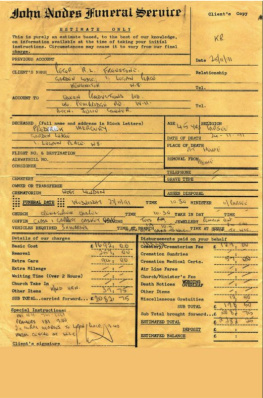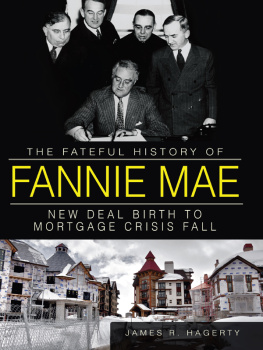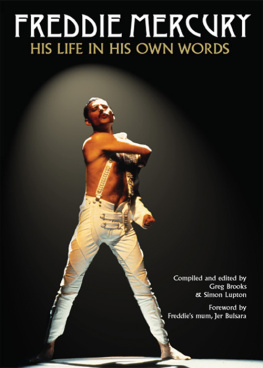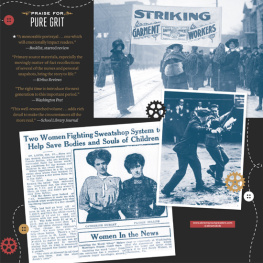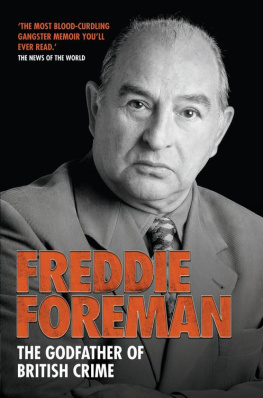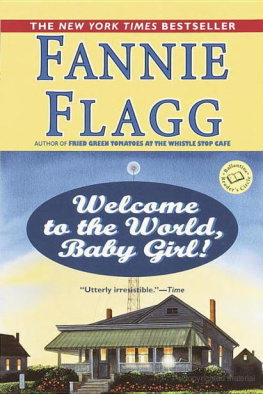



Shaky Ground:
The Strange Saga of the U.S. Mortgage Giants
Copyright 2015 by Bethany McLean
All rights reserved
Published by Columbia Global Reports
91 Claremont Avenue, Suite 515
New York, New York 10027
http://globalreports.columbia.edu/
facebook.com/columbiaglobalreports
@columbiaGR
Library of Congress Control Number: 2015940135
ISBN: 978-0-9909763-1-8
Book design by Strick & Williams
Map design by Jeffrey L. Ward
Author photograph credit: Steven Laxton
CONTENTS
What are the risks remaining to the global financial system in the wake of the crisis of 2008? I have thought a lot about this topic, but Ive always believed that trying to forecast the cause of the next meltdown is an exercise in futility. One rule about financial crises that seems to hold true is that the spark that lights the fire is never what everyone, or even anyone, was expecting.
Nevertheless, there is a big issue left over from the darkest days of the financial crisis, and while it might not be the cause of an imminent meltdown, it is a festering problem. That is what to do about Fannie Mae and Freddie Mac, the mortgage giants that the U.S. government took over in the fall of 2008 by putting them into conservatorship, a state in which they are supported by a line of credit from the Treasury and effectively run by a government agency. We were supposed to figure out how to resolve these controversial companiescollectively called the GSEs, for government-sponsored enterprisesand maybe even to push RESTART on the role that the government has long played in promoting and supporting Americas cult of homeownership. But here we are, seven years after Fannie and Freddie were taken over. The big banks have at least superficially paid back the money the government gave them; General Motors and Chrysler are out of bankruptcy; but Fannie and Freddie are still in conservatorship. Even more significant, most of the mortgage market in this country is now supported by government agencies, more so than it was before the financial crisis. The former governor of the Bank of England, Mervyn King, told me this: Most countries have socialized health care and a free market for mortgages. You in the United States do exactly the opposite.
Its a strange state of affairsbut Ive come to believe that in the world of Fannie and Freddie, strange is actually normal. Start with the fact that although these two companies touch the lives of almost every American who has a mortgage and even many who rentthey determine who gets mortgage credit and at what price, especially todayvery few people understand what they do. They are part of the hidden machinery of the world that makes our lives, in this case our financial lives, possible, but which we never think aboutor wont until theres a problem. Another oddity about these companies is that while homes are the most domestic asset possible, Fannie and Freddie are global, because through their securities, foreign investors, including Chinas central bank, finance the purchase of Americans homes. This seems like a good thingits globalization at work!but, as the story of Fannie and Freddie shows, it has also tied the hands of the government at critical times.
The story really is a saga, with all sorts of unexpected twists and turns, and conspiracy theories galore. You cant make this stuff up, longtime lobbyist once told me. The GSE world is a cross between Monty Python and Shakespeare. Right now, a group of investors is suing the U.S. government over how it has handled Fannie and Freddie, and while you might think that the investors, which are mostly powerful hedge funds, are only looking after their own dollarand they areIve also come to believe that theyre looking after the rest of us by providing a check on the governments behavior that otherwise wouldnt exist.
I first started writing about the GSEs in 2004, when Fannie had an accounting scandal. Even though Id been covering business for almost a decade at that point, I still couldnt believe that anything like Fannie and Freddie existed. They were (and are) unimaginably gigantic companies that were like mythical beastspart government agencies and part normal companies, with shareholders and boards of directors. There was always an argument that this sort of public-private partnership, which harnessed the power of the government to the discipline of the market, was the best of all possible worlds. But at the time I wrote about Fannie, I was convinced that it was a bad actor. When Fannie executives argued that their enemies just wanted to turn their business over to the big banks, along with their profits, I thought that was just a conspiracy theory. And even if I had believed it, I would have thought, Well, whats wrong with that? I too was a believer in what Franklin Raines, Fannies former CEO, calls marketification: the idea that the free market fixes all.
That was long before the financial crisis, about which even Alan Greenspan, that ardent believer in Ayn Rands libertarianism, said in 2008: Those of us who have looked to the self-interest of lending institutions to protect shareholders equity, myself included, are in a state of shocked disbelief. There were lots of villains in the run-up to the financial crisis, which is why Joe Nocera and I titled our 2010 book All the Devils Are Here. And while Fannie and Freddie were two of the villains, by no means were they the only ones. I would have liked to have blamed the financial crisis on themthere would be much more clarity that way, and wed be able to keep the religion that is marketification alivebut I have never been able to make the facts line up with that narrative.
Ive never found any simple way to summarize what I think about the GSEs, although I have come to my own view about where we are today and where we should go. I dont think everyone should agree with me. But I do think everyone should care. What Ive tried to do in this book is to lay out the facts in a way that I hope will help readers think about the issues and make up their own minds. This is too important to let special interests determine the outcome while we all play possum.
CAST OF CHARACTERS
Fannie Mae
Jim Johnson
CEO, 19911998
Franklin Raines
CEO, 19992004
Daniel Mudd
CEO, 20052008
Timothy Mayopoulos
CEO, 2012current
Timothy Howard
CFO, 19902004
Thomas Lund
Executive Vice President of
Single-Family Mortgage Business
2005-2009
Freddie Mac
Leland Brendsel
CEO, 19872003
Richard Syron
CEO, 20032007
Federal Housing Finance Agency
Ed DeMarco
Director, 20092014
Mel Watt
Director, 2014current
Office of Federal Housing Enterprise Oversight
Jim Lockhart
Director, 20062008;
Director of the FHFA, 20082009
Armando Falcon
Director, 19992005
White House
Henry Paulson
Secretary of the Treasury, 20062009
Timothy Geithner
Secretary of the Treasury, 20092013
Lawrence Summers
Director of the National Economic Council, 20092010
Gene Sperling
Director of the National Economic Council, 20112014
Austan Goolsbee
Next page

